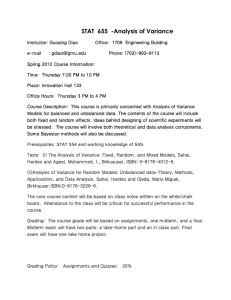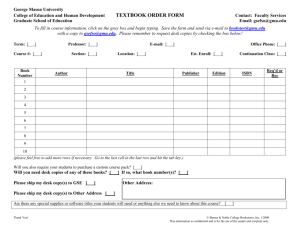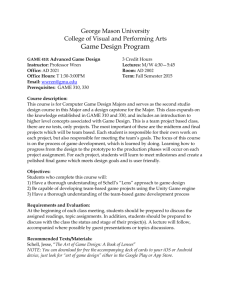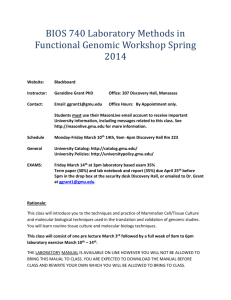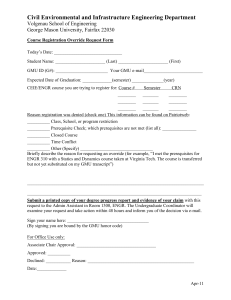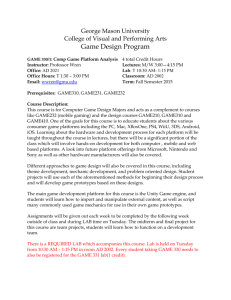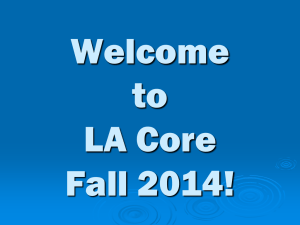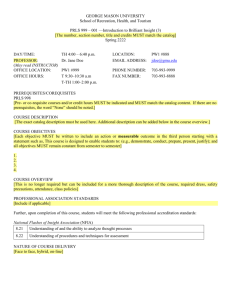George Mason University College of Visual and Performing Arts
advertisement
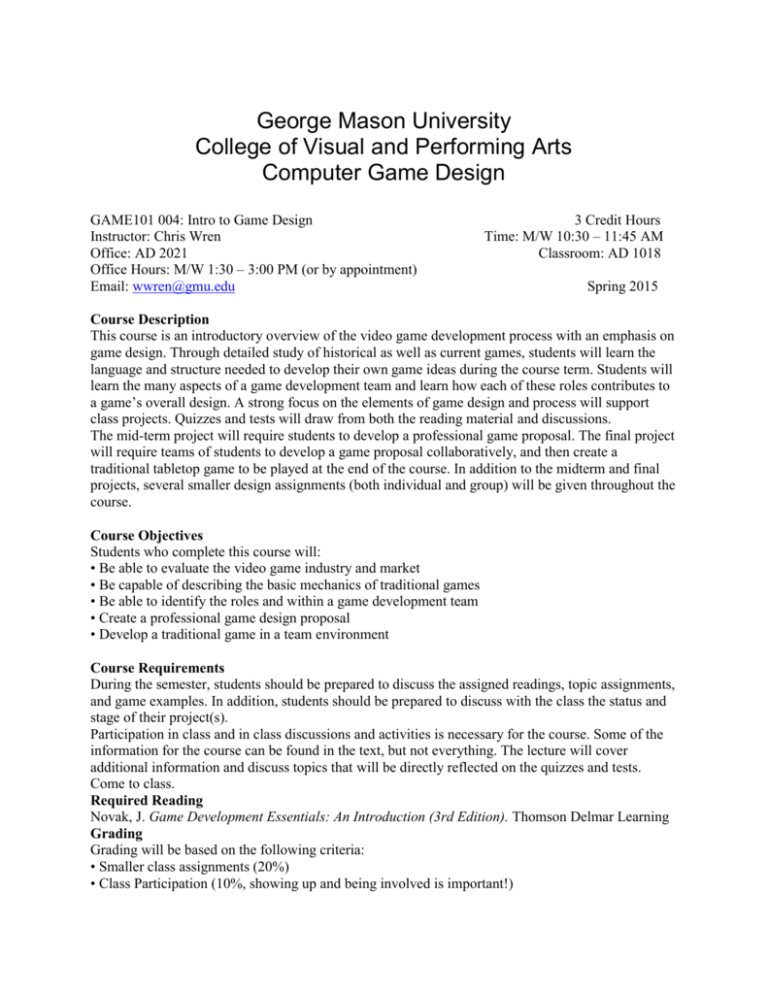
George Mason University College of Visual and Performing Arts Computer Game Design GAME101 004: Intro to Game Design Instructor: Chris Wren Office: AD 2021 Office Hours: M/W 1:30 – 3:00 PM (or by appointment) Email: wwren@gmu.edu 3 Credit Hours Time: M/W 10:30 – 11:45 AM Classroom: AD 1018 Spring 2015 Course Description This course is an introductory overview of the video game development process with an emphasis on game design. Through detailed study of historical as well as current games, students will learn the language and structure needed to develop their own game ideas during the course term. Students will learn the many aspects of a game development team and learn how each of these roles contributes to a game’s overall design. A strong focus on the elements of game design and process will support class projects. Quizzes and tests will draw from both the reading material and discussions. The mid-term project will require students to develop a professional game proposal. The final project will require teams of students to develop a game proposal collaboratively, and then create a traditional tabletop game to be played at the end of the course. In addition to the midterm and final projects, several smaller design assignments (both individual and group) will be given throughout the course. Course Objectives Students who complete this course will: • Be able to evaluate the video game industry and market • Be capable of describing the basic mechanics of traditional games • Be able to identify the roles and within a game development team • Create a professional game design proposal • Develop a traditional game in a team environment Course Requirements During the semester, students should be prepared to discuss the assigned readings, topic assignments, and game examples. In addition, students should be prepared to discuss with the class the status and stage of their project(s). Participation in class and in class discussions and activities is necessary for the course. Some of the information for the course can be found in the text, but not everything. The lecture will cover additional information and discuss topics that will be directly reflected on the quizzes and tests. Come to class. Required Reading Novak, J. Game Development Essentials: An Introduction (3rd Edition). Thomson Delmar Learning Grading Grading will be based on the following criteria: • Smaller class assignments (20%) • Class Participation (10%, showing up and being involved is important!) • Midterm Project (30%) • Final Project (40%) Grading Scale 100%-90%: A 89%-80%: B 79%-70%: C 69%-60%: D 59%-0%: F ACADEMIC INTEGRITY The integrity of the University community is affected by the individual choices made by each of us. GMU has an Honor Code with clear guidelines regarding academic integrity. Three fundamental and rather simple principles to follow at all times are that: (1) all work submitted be your own; (2) when using the work or ideas of others, including fellow students, give full credit through accurate citations; and (3) if you are uncertain about the ground rules on a particular assignment, ask for clarification. No grade is important enough to justify academic misconduct. Plagiarism means using the exact words, opinions, or factual information from another person without giving the person credit. Writers give credit through accepted documentation styles, such as parenthetical citation, footnotes, or endnotes. Paraphrased material must also be cited, using MLA or APA format. A simple listing of books or articles is not sufficient. Plagiarism is the equivalent of intellectual robbery and cannot be tolerated in the academic setting. If you have any doubts about what constitutes plagiarism, please see me. As in many classes, a number of projects in this class are designed to be completed within your study group. With collaborative work, names of all the participants should appear on the work. Collaborative projects may be divided up so that individual group members complete portions of the whole, provided that group members take sufficient steps to ensure that the pieces conceptually fit together in the end product. Other projects are designed to be undertaken independently. In the latter case, you may discuss your ideas with others and conference with peers on drafts of the work; however, it is not appropriate to give your paper to someone else to revise. You are responsible for making certain that there is no question that the work you hand in is your own. If only your name appears on an assignment, your professor has the right to expect that you have done the work yourself, fully and independently. GMU is an Honor Code university; please see the Office for Academic Integrity for a full description of the code and the honor committee process. The principle of academic integrity is taken very seriously and violations are treated gravely. What does academic integrity mean in this course? Essentially this: when you are responsible for a task, you will perform that task. When you rely on someone else’s work in an aspect of the performance of that task, you will give full credit in the proper, accepted form. Another aspect of academic integrity is the free play of ideas. Vigorous discussion and debate are encouraged in this course, with the firm expectation that all aspects of the class will be conducted with civility and respect for differing ideas, perspectives, and traditions. When in doubt (of any kind) please ask for guidance and clarification. MASON EMAIL ACCOUNTS Students must use their MasonLIVE email account to receive important University information, including messages related to this class. See http://masonlive.gmu.edu for more information. All digital communication with the professor must be made using your “masonlive” email account. OFFICE OF DISABILITY SERVICES If you have a documented learning disability or other condition that may affect academic performance you should: 1) make sure this documentation is on file with Office of Disability Services (SUB I, Rm. 4205; 993-2474; http://ods.gmu.edu ) to determine the accommodations you need; and 2) talk with me to discuss your accommodation needs. If you are a student with a disability and you need academic accommodations, please see me and contact the Office of Disability Services (ODS) at 993-2474, http://ods.gmu.edu. All academic accommodations must be arranged through the ODS. If you have a learning or physical difference that may affect your academic work, you will need to furnish appropriate documentation to the Office of Disability Services. If you qualify for accommodation, the ODS staff will give you a form detailing appropriate accommodations for your instructor. In addition to providing your professors with the appropriate form, please take the initiative to discuss accommodation with them at the beginning of the semester and as needed during the term. Because of the range of learning differences, faculty members need to learn from you the most effective ways to assist you. If you have contacted the Office of Disability Services and are waiting to hear from a counselor, please tell me. DIVERSITY George Mason University promotes a living and learning environment for outstanding growth and productivity among its students, faculty and staff. Through its curriculum, programs, policies, procedures, services and resources, Mason strives to maintain a quality environment for work, study and personal growth. An emphasis upon diversity and inclusion throughout the campus community is essential to achieve these goals. Diversity is broadly defined to include such characteristics as, but not limited to, race, ethnicity, gender, religion, age, disability, and sexual orientation. Diversity also entails different viewpoints, philosophies, and perspectives. Attention to these aspects of diversity will help promote a culture of inclusion and belonging, and an environment where diverse opinions, backgrounds and practices have the opportunity to be voiced, heard and respected. The reflection of Mason’s commitment to diversity and inclusion goes beyond policies and procedures to focus on behavior at the individual, group and organizational level. The implementation of this commitment to diversity and inclusion is found in all settings, including individual work units and groups, student organizations and groups, and classroom settings; it is also found with the delivery of services and activities, including, but not limited to, curriculum, teaching, events, advising, research, service, and community outreach. Acknowledging that the attainment of diversity and inclusion are dynamic and continuous processes, and that the larger societal setting has an evolving socio-cultural understanding of diversity and inclusion, Mason seeks to continuously improve its environment. To this end, the University promotes continuous monitoring and self-assessment regarding diversity. The aim is to incorporate diversity and inclusion within the philosophies and actions of the individual, group and organization, and to make improvements as needed. OTHER USEFUL CAMPUS RESOURCES: WRITING CENTER: A114 Robinson Hall; (703) 993-1200; http://writingcenter.gmu.edu UNIVERSITY LIBRARIES “Ask a Librarian” http://library.gmu.edu/mudge/IM/IMRef.html COUNSELING AND PSYCHOLOGICAL SERVICES (CAPS): (703) 993-2380; http://caps.gmu.edu LIST OF STUDENT SUPPORT RESOURCES ON CAMPUS: http://ctfe.gmu.edu/teaching/student-support-resources-on-campus/ UNIVERSITY POLICIES The University Catalog, http://catalog.gmu.edu, is the central resource for university policies affecting student, faculty, and staff conduct in university academic affairs. Other policies are available at http://universitypolicy.gmu.edu/. All members of the university community are responsible for knowing and following established policies. GMU HOLIDAY CALENDAR http://ulife.gmu.edu/calendar/religious-holiday-calendar/
